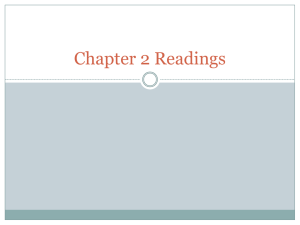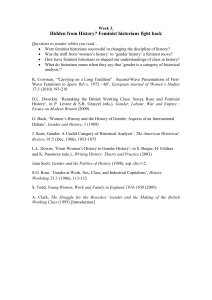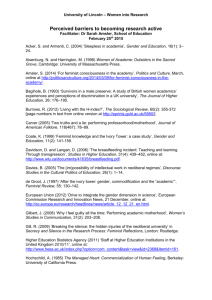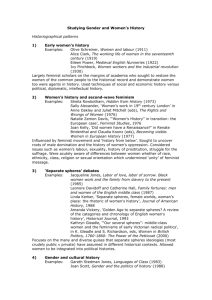Syllabus
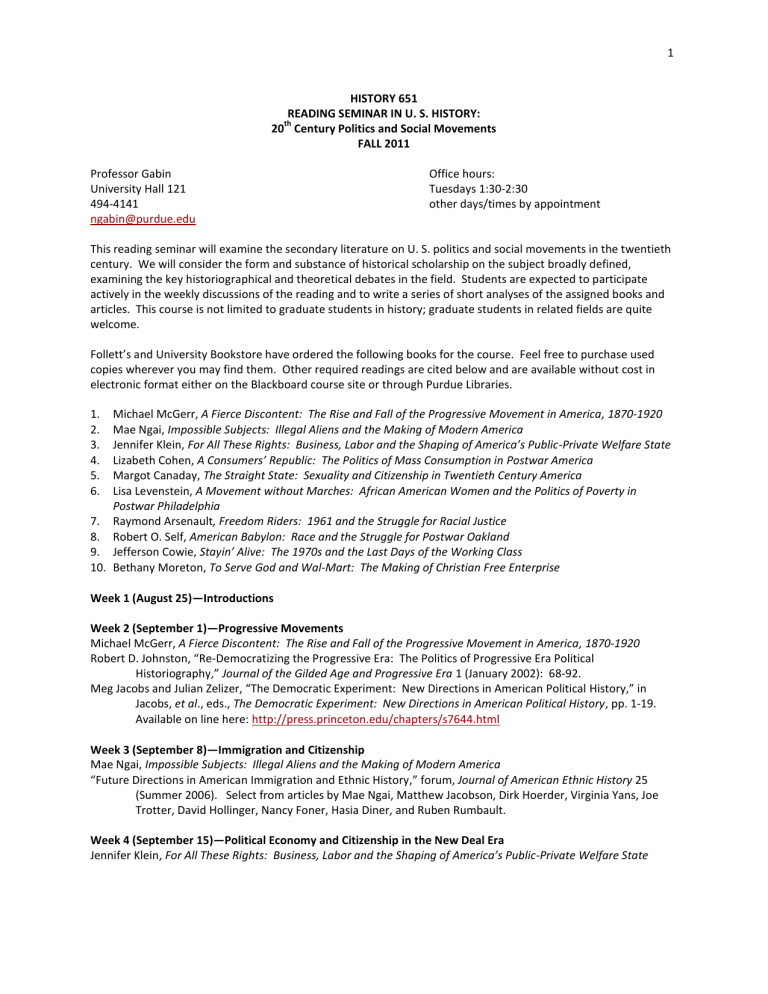
1
HISTORY 651
20
READING SEMINAR IN U. S. HISTORY: th
Century Politics and Social Movements
FALL 2011
Professor Gabin
University Hall 121
494-4141
Office hours:
Tuesdays 1:30-2:30 other days/times by appointment ngabin@purdue.edu
This reading seminar will examine the secondary literature on U. S. politics and social movements in the twentieth century. We will consider the form and substance of historical scholarship on the subject broadly defined, examining the key historiographical and theoretical debates in the field. Students are expected to participate actively in the weekly discussions of the reading and to write a series of short analyses of the assigned books and articles. This course is not limited to graduate students in history; graduate students in related fields are quite welcome.
Follett’s and University Bookstore have ordered the following books for the course. Feel free to purchase used copies wherever you may find them. Other required readings are cited below and are available without cost in electronic format either on the Blackboard course site or through Purdue Libraries.
1.
Michael McGerr, A Fierce Discontent: The Rise and Fall of the Progressive Movement in America, 1870-1920
2.
Mae Ngai, Impossible Subjects: Illegal Aliens and the Making of Modern America
3.
Jennifer Klein, For All These Rights: Business, Labor and the Shaping of America’s Public-Private Welfare State
4.
Lizabeth Cohen, A Consumers’ Republic: The Politics of Mass Consumption in Postwar America
5.
Margot Canaday, The Straight State: Sexuality and Citizenship in Twentieth Century America
6.
Lisa Levenstein, A Movement without Marches: African American Women and the Politics of Poverty in
Postwar Philadelphia
7.
Raymond Arsenault , Freedom Riders: 1961 and the Struggle for Racial Justice
8.
Robert O. Self, American Babylon: Race and the Struggle for Postwar Oakland
9.
Jefferson Cowie, Stayin’ Alive: The 1970s and the Last Days of the Working Class
10.
Bethany Moreton, To Serve God and Wal-Mart: The Making of Christian Free Enterprise
Week 1 (August 25)—Introductions
Week 2 (September 1)—Progressive Movements
Michael McGerr, A Fierce Discontent: The Rise and Fall of the Progressive Movement in America, 1870-1920
Robert D. Johnston, “Re-Democratizing the Progressive Era: The Politics of Progressive Era Political
Historiography,” Journal of the Gilded Age and Progressive Era 1 (January 2002): 68-92.
Meg Jacobs and Julian Zelizer, “The Democratic Experiment: New Directions in American Political History,” in
Jacobs, et al ., eds., The Democratic Experiment: New Directions in American Political History , pp. 1-19.
Available on line here: http://press.princeton.edu/chapters/s7644.html
Week 3 (September 8)—Immigration and Citizenship
Mae Ngai, Impossible Subjects: Illegal Aliens and the Making of Modern America
“Future Directions in American Immigration and Ethnic History,” forum, Journal of American Ethnic History 25
(Summer 2006). Select from articles by Mae Ngai, Matthew Jacobson, Dirk Hoerder, Virginia Yans, Joe
Trotter, David Hollinger, Nancy Foner, Hasia Diner, and Ruben Rumbault.
Week 4 (September 15)—Political Economy and Citizenship in the New Deal Era
Jennifer Klein, For All These Rights: Business, Labor and the Shaping of America’s Public-Private Welfare State
2
Jeff Cowie and Nick Salvatore, “The Long Exception: Rethinking the Place of the New Deal in American History ,”
International Labor and Working-Class History 74 (Fall 2008): 3-32. Responses by Kevin Boyle, Michael
Kazin, Jennifer Klein, David Montgomery, and Nancy MacLean, pp. 33-69.
Week 5 (September 22) — Politics of Consumption
Lizabeth Cohen, A Consumers’ Republic: The Politics of Mass Consumption in Postwar America
“Exchange: American Consumerism,” comments by David Steigerwald, T. H. Breen, and Lizabeth Cohen, Journal of
American History 93 (September 2006): 385-413.
Week 6 (September 29)—Gender, Sexuality, and the State
Margot Canaday, The Straight State: Sexuality and Citizenship in Twentieth Century America
Leisa Meyer, “Interrupting Norms and Constructing Deviances: Competing Frameworks in the Histories of
Sexualities in the United States,” in S. Jay Kleinberg, et al ., eds., The Practice of U. S. Women’s History , pp.
280-307.
Joanne Meyerowitz, “Transnational Sex and U. S. History,” American Historical Review 114 (December 2009):
1273-86.
Week 7 (October 6) — Race and Gender Politics at Mid-Century
Lisa Levenstein, A Movement without Marches: African American Women and the Politics of Poverty in Postwar
Philadelphia
Robin Kelley, “’We are not what we seem’: Rethinking Black Working Class Opposition in the Jim Crow South,”
Journal of American History 80 (June 1993): 75-112.
Kevin Gaines, “The Historiography of the Struggle for Black Equality since 1945,” in Jean-Christophe Agnew and
Roy Rosenzweig, eds., A Companion to Post-1945 America , pp. 211-34.
Week 8 (October 13)—Black Freedom Movement
Raymond Arsenault, Freedom Riders: 1961 and the Struggle for Racial Justice
Jacquelyn Dowd Hall, “The Long Civil Rights Movement and the Political Uses of the Past,” Journal of American
History 91 (March 2005): 1233-63.
Week 9 (October 20) — Politics of Race and Place in the North
Robert O. Self, American Babylon: Race and the Struggle for Postwar Oakland
Robert Self and Thomas Sugrue, “The Power of Place: Race, Political Economy, and Identity in the Postwar
Metropolis,” in Jean-Christophe Agnew and Roy Rosenzweig, eds., A Companion to Post-1945 America , pp. 20-43.
Peniel Joseph, “The Black Power Movement: A State of the Field,” Journal of American History 96 (December
2009): 751-76.
Week 10 (October 27)—no class meeting
Week 11 (November 3) —Other Sixties/Seventies Movements
Here are six recent articles on movements of the 1960s-1970s. Those by Matt Lassiter, Michelle Nickerson, and
James Turner are important in the new history of conservatism. The articles by Adam Rome, Kevin Mumford and
Marc Rodriguez offer fresh perspectives on other but related movements. I would like you to consider these six articles but also scan the table of contents of other journals for the last several years and select articles of particular interest to you. Be prepared to share the results of your search with the seminar.
Marc S. Rodriguez, “A Movement Made of ‘Young Mexican Americans Seeking Change’: Critical Citizenship,
Migration, and the Chicano Movement in Texas and Wisconsin, 1960-1975,” Western Historical Quarterly
34 (2003): 274-99.
Kevin Mumford, “The Trouble with Gay Rights: Race and the Politics of Sexual Orientation in Philadelphia, 1969–
1982,” Journal of American History 98 (June 2011): 49-72.
3
Matthew Lassiter, “The Suburban Origins of ‘Color-Blind’ Conservatism: Middle-Class Consciousness in the
Charlotte Busing Crisis,” Journal of Urban History 30 (May 2004): 549-82.
Michelle Nickerson, "Moral Mothers and Goldwater Girls," in David Farber and Jeff Roche, eds., The Conservative
Sixties , 51-62.
Adam Rome, “’Give Earth a Chance’: the Environmental Movement and the Sixties,” Journal of American History
90 (September 2003): 525-54.
James Morton Turner, “’The Specter of Environmentalism’: Wilderness, Environmental Politics and the Evolution of the New Right,” Journal of American History 96 (June 2009): 123-48.
Week 12 (November 10) — Feminist Movement
All read these two historiographical articles:
Nancy MacLean, “Postwar Women’s History: The ‘Second Wave’ or the End of the Family Wage,” in Jean-
Christophe Agnew and Roy Rosenzweig, eds., A Companion to Post-1945 America , pp. 235-59.
Kristin Celello, “A New Century of Struggle: Feminism and Antifeminism in the United States, 1920-Present,” in S.
Jay Kleinberg, et al ., eds., The Practice of U. S. Women’s History , pp. 329-45.
Then select at least six of the following recent articles:
Premilla Nadasen, “Expanding the Boundaries of the Women’s Movement: Black Feminism and the Struggle for
Welfare Rights,” Feminist Studies 28 (2002): 271-301.
Anne Valk, “Fighting for Abortion as a ‘Health Right’ in Washington, D. C.,” in Stephanie Gilmore, ed., Feminist
Coalitions , pp. 135-62.
Jennifer Nelson, “’All this that has happened to me shouldn’t happen to nobody else’: Loretta Ross and the
Women of Color Reproductive Freedom Movement of the 1980s,” Journal of Women’s History 22 (Fall
2010): 136-60.
Wendy Kline, “Bodies of Evidence: Activists, Patients, and the FDA Regulation of Depo-Provera,” Journal of
Women’s History 22 (Fall 2010): 64-87.
Anne Valk, “Living a Feminist Lifestyle: The Intersection of Theory and Action in a Lesbian Feminist Collective,”
Feminist Studies 28 (Summer 2002): 303-32.
Anne Enke, “Taking over Domestic Space: The Battered Women’s Movement and Public Protest,” in Van Gosse and Richard Moser, eds., The World the Sixties Made , pp. 162-90.
Maria Bevacqua, “Reconsidering Violence against Women: Coalition Politics in the Antirape Movement,” in
Stephanie Gilmore, ed., Feminist Coalitions , pp. 163-77.
Marisela Chávez, “Pilgrimage to the Homeland: California Chicanas and International Women’s Year, Mexico City,
1975,” in Vicki Ruiz and John Chávez, eds., Memories and Migrations , pp. 170-95.
Roberta Gold, “’I Had Not Seen Women like That Before’: Intergenerational Feminism in New York City's Tenant
Movement,” Feminist Studies 35 (Summer 2009): 387-415.
Marisa Chappell, “Demanding a New Family Wage: Feminist Consensus in the 1970s Full Employment Campaign,” in Stephanie Gilmore, ed., Feminist Coalitions , pp. 252-84.
Kathleen M. Barry,”‘Too Glamorous to be Considered Workers’: Flight Attendants and Pink-Collar Activism in Mid-
Twentieth Century America,” Labor 3 (Fall 2006): 119-138.
Katherine Turk, “Out of the Revolution, into the Mainstream: Employment Activism in the NOW Sears Campaign and the Growing Pains of Liberal Feminism,” Journal of American History 97 (September 2010): 339-423.
Week 13 (November 17) — Class Politics in the Seventies
Jefferson Cowie , Stayin’ Alive: The 1970s and the Last Days of the Working Class
Kim Phillips-Fein, “1973 to the Present,” in Eric Foner and Lisa McGirr, eds., American History Now , pp. 175-97.
Week 14 (November 24)—Thanksgiving/no class meeting
Week 15 (December 1) — Religion, Politics and Culture at the End of the Century
Bethany Moreton, To Serve God and Wal-Mart: The Making of Christian Free Enterprise
Articles to be announced
4
Week 16 (December 8) — no class meeting
ASSIGNMENTS
Reading:
The reading consists of a monograph (and a historiographical article or two) each week, with the exception of
Weeks 11 and 12, when you’ll select articles from a longer list. Active, critical discussion in class will play an important role in this course. Participation in the seminar is essential to the teaching/learning process and to your grade. It is not so much that I want you to speak for the sake of speaking, but that I want you to accept some responsibility for engaging others and for the energy and focus of the seminar. Some people will always be shyer and some more talkative than others but everyone should come prepared each week having not only read the assigned materials, but also having thought about them and prepared some questions or responses—even if you choose not to submit a reading response paper or review essay that week.
Writing:
The writing assignments will be discussed in greater detail in class, but here are some observations about their goals and purposes. Among the questions we will ask of our readings, both individually and collectively, are: what approaches do the authors take methodologically and theoretically? What historiographical traditions do the books follow or reshape? What sources do they use and how do they use them? What contributions do the books and articles make to social history, political history, social movement history, legal history, labor history, gender history and other historical sub-specialties? These sorts of questions should drive your writing for the course, both the more informal response papers and the more formal critiques.
■ Every week , please email one-to-three discussion questions to the class using the course email list-fall-2011hist-65100-001@lists.purdue.edu
--by Wednesday at 3 pm.
These questions should relate to what you've read, can be cumulative—bringing in previous weeks’ reading—and should be designed to stimulate group discussion and/or to clarify significant issues.
■ In seven of the twelve weeks you will submit a 2 pp. /550 word response to the reading. You decide which weeks you will submit responses and which weeks you will not. These responses are due in electronic or hard copy at the start of class. In these more informal response papers you may do any number of things. You should do more than write a précis (abstract or summary) of what you’ve read. Instead, consider how the historian treats certain themes or sources. What did you find most interesting and compelling? What was successful? What was less effective in argument, evidence, and execution? You could explicitly compare and contrast the arguments or frameworks of different historians. You could respond to one or more of the goals mentioned in the writing paragraph above. Remember that these are informal writing exercises. Relax and take risks. But please don’t just free associate—keep your eye on specific readings. The responses should provide the basis for your participation in discussion.
■ In two other of the twelve weeks you will write a 4 pp. /1000 word comparative analysis of the reading for any two weeks. These two papers should be more formal review essays similar in design and content to book reviews for journals like the Journal of American History , Reviews in American History and American Quarterly . These essays are due (electronic format—email attachments are okay) by the Monday following the seminar meeting in which we discussed the second of the two books.
GRADING
Class discussion (12 meetings):
Reading responses (7 of 12 weeks):
Review essays (2 of 12 weeks):
45 per cent
35 per cent
20 per cent

